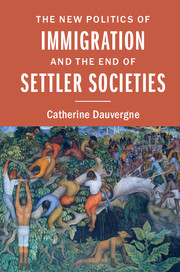2 - Settler societies and the immigration imagination
Published online by Cambridge University Press: 05 March 2016
Summary
Throughout the entire first century of global migration regulation, from the early 1900s to the present, a distinction between settler societies and others has informed and predicted patterns of migration and migration regulation. This distinction served as a guide to strategies of recruitment and reception, to global alliances around migration questions, to approaches to asylum, and to citizenship. This era has now come to a close. The work of this book is to demonstrate how and why this is so, and to outline what new predictors or patterns of migration and migration regulation may now be valuable. Global migration regulation first developed in the context of settler societies, and their demise contains key markers for the future. To understand why any of this matters, however, it is first crucial to understand how the concept of a settler society ordered global migration for more than a century. This chapter begins with unraveling this ordering, and then examines the legal architecture of migration in the settler society and considers the insights of critiques of the settler society concept.
Settler society is not a scientific category. It is an idea with a core of meaning, and considerable slippage around the edges. One is just as likely to see the term used by social commentators and politicians as by academics. This low-key omnipresence is part of its importance – it has slipped into everyday discourse. A rigorous definition is not helpful, as my purpose is not to stake out and police boundaries of a certain category. Indeed, some of the work of this book depends on a degree of wobbliness in the concept, on its ability to mean different things at different times or for different people. But it is important to set out the broad parameters of the idea. When a journalist, a politician, or a geographer talks about a settler society, we do know what they mean.
A mythology of immigration is the core of the settler society. Settler societies were built from the ground up by people who left European nations and sought permanent homes in the New World. In an era of colonial empires, settler societies were a distinct chapter in the dominant colonizing narrative. While these were, of course, colonies of European empires, their ostensible “emptiness” distinguished them from colonies in Africa, Asia, and the Indian subcontinent.
- Type
- Chapter
- Information
- Publisher: Cambridge University PressPrint publication year: 2016



